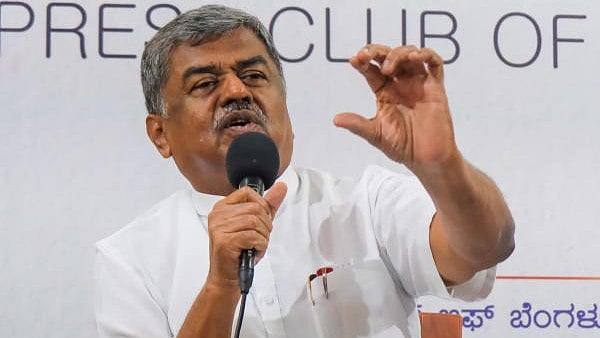
Senior Congress leader B K Hariprasad
Credit: DH Photo/Mariya S Mattathil
Bengaluru: The Congress government’s proposed law to curb hate speech and hate crimes has raised two critical questions.
Could some clauses be potentially misused, and will it change the contours of the rhetoric-driven electioneering?
The Karnataka Hate Speech and Hate Crimes (Prevention and Control) Draft Bill criminalises hate speech with a maximum prison term of three years, a fine of Rs 5,000 or both.
The bill has been seen as an ideological commitment of the Congress. In its manifesto for the 2023 Assembly elections, the party declared its commitment to take “firm and decisive action” against individuals and organisations spreading hatred amongst communities on grounds of caste and religion.
The government has also been working on the Karnataka Mis-information Regulation Bill, which criminalises misinformation.
The draft bill defines hate speech as intentional publishing, propagation or advocacy of anything or communication to one or more persons in a manner that could reasonably be construed to demonstrate a clear intention to harm or incite harm or promote or propagate hatred, based on religion, race, caste or community, sex, gender, sexual orientation, place of birth, residence, language, disability or tribe.
Critics have slammed the “vagueness” of the bill, and have sought a clear, specific and precise definition of what constitutes hate speech and hate crime.-
While the draft bill also criminalises abetting and assisting a hate crime, the quantum of punishment remains three years for all kinds of offences.
“For a physical, violent hate crime which can lead to lynching and emotion harm, the prison term is the same as it is for abetting or aiding hate speech (maximum prison term of three years, a fine of Rs 5,000 or both.) Any reasonable person will understand that there must be a gradation, and that the quantum of the sentence must change depending on the severity of the offence,” lawyer-activist Manavi Atri said.
The Campaign Against Hate Speech recently wrote to IT/BT Minister Priyank Kharge.
While welcoming the intent of the government to address hate speech, the letter pointed out that the draft bill suffers from serious “conceptual, legal and structural flaws”.-
Noting that the draft does not address the “structural problem of the state’s inability to hold perpetrators of hate speech liable via the judiciary,” the letter urged the government to enable “multi-stakeholder” consultations before tabling in the legislature.
However, senior Congress leader B K Hariprasad batted for the bill, stating that a “strong legal insulation” against hate speech was crucial.
Pointing out to the crucial role played by the courts in such cases, he said:
“Interpretation by the courts is also going wrong. When Anurag Thakur said ‘Desh ke gaddaron ko, goli maron salo ko,’ the court said he had said it with smiles. What does it mean? If someone says provocative things by smiling, isn’t it provocation? Whether you say things with a smile, arrogance or anger, hate is hate. These people shouldn’t be able to escape.”
Hariprasad said the Bill should criminalise prejudice against a profession, pointing to Bangalore South BJP MP Tejasvi Surya’s “puncherwala” jibe.
“Calling SC/STs through caste terms is an atrocity. Similarly, calling someone a puncherwala insults a profession,” he said.
While BJP leader and former law minister S Suresh Kumar concurred that prejudice against profession must also be criminalised, he feared the bill would be used as a “political tool” to suppress “genuine feelings”.
“The ruling party should think and believe that charity begins at home. Their ministers should stop inciting and must come out of a hate mindset. Whatever may be their intention, we don’t know how this will be used or abused,” Suresh Kumar added.
He favoured extensive dialogues and discussions before the Bill is tabled.
The bill spares artistic creativity, performances, academic or scientific inquiry, fair and accurate reporting in the public interest from the realm of hate speech.
It further notes that proselytisation or espousing of any religious tenet, belief, teaching, doctrine or writings doesn’t amount to hate crime as long as it doesn’t advocate hatred that constitutes incitement to cause harm.
“But who is the interpreter for these definitions?” wondered political analyst Harish Ramaswamy.
“These initiatives are good as long as they are non-political. However, once things get political, whatever you (a particular ruling dispensation) don’t like, can be construed as hate. This way, critical comments on religion will potentially come under hate”.